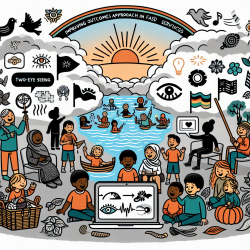The landscape of special education is constantly evolving, driven by a commitment to ensuring that all children, including those with unique learning needs, have access to the resources and support they require to thrive. In this dynamic environment, the integration of technology in therapeutic services, such as speech therapy, has emerged as a beacon of hope and progress. It's a development that not only expands access but also introduces a new dimension of engagement and effectiveness in addressing the needs of kids in schools. As a Special Education Director, my journey in navigating and implementing these advancements has been one of joy and discovery, leading to an enriched learning experience for students and a more inclusive educational framework.
The advent of online speech therapy services, such as those provided by TinyEYE, has been a game-changer in the field of special education. This innovative approach has made it possible to overcome traditional barriers such as therapist shortages and geographical limitations, ensuring that every child has the opportunity to benefit from high-quality speech therapy. For special education funding agencies, understanding the impact and potential of these services is crucial in fostering environments where children can excel.
Speech therapy in schools plays a pivotal role in helping students with speech and language disorders to improve their communication skills, which are essential for their academic success and social integration. However, the challenge of ensuring adequate provision of these services is significant. Staffing shortages, particularly in rural or underserved areas, have historically limited access for many students. Furthermore, the COVID-19 pandemic has underscored the necessity of adaptable and resilient educational models that can continue to support students through unforeseen circumstances.
Online speech therapy services address these challenges head-on by offering flexible, innovative solutions that meet the needs of students, schools, and therapists. The benefits of these services are manifold. For students, they provide a stimulating and engaging learning environment that leverages technology to make therapy sessions more interactive and enjoyable. For schools, they offer a cost-effective solution to therapist staffing shortages, eliminating the need for travel and enabling therapists to work with students from any location. For therapists, online platforms offer the flexibility to manage their caseloads more efficiently, allowing them to focus on delivering high-quality care without the constraints of traditional service delivery models.
The joy in witnessing the transformation of students who engage with online speech therapy is profound. Kids who were once hesitant to participate in class discussions become more confident in their ability to communicate, leading to improved academic performance and social interactions. The progress made in these sessions is not just a testament to the effectiveness of speech therapy but also to the power of technology in enhancing educational outcomes.
For special education funding agencies, investing in online therapy services is an investment in the future of education. It's a commitment to removing barriers and creating a more inclusive learning environment where every child has the opportunity to succeed. The scalability of online services means that schools can adapt to changing needs and demographics without compromising the quality of care. Additionally, the data-driven nature of online therapy platforms enables continuous improvement and customization of services to meet the unique needs of each student.
As we look to the future, the integration of online therapy services in special education programs presents an exciting opportunity for growth and innovation. It's a pathway to not only addressing immediate challenges but also to reimagining what's possible in supporting the diverse needs of students. The role of special education funding agencies in this process is critical. By prioritizing investments in technology and online services, they can empower schools and educators to deliver more effective, efficient, and engaging therapeutic support.
In conclusion, the journey of integrating online speech therapy services into special education is one of joy, discovery, and transformative impact. It's a journey that underscores the importance of embracing technology as a tool for enhancing educational outcomes and ensuring that every child, regardless of their challenges, has the opportunity to grow and succeed. As a Special Education Director, my hope is that this exploration of online therapy services inspires special education funding agencies to see the potential and power of these innovations. Together, we can create a future where every child has access to the support they need to thrive in school and beyond.










